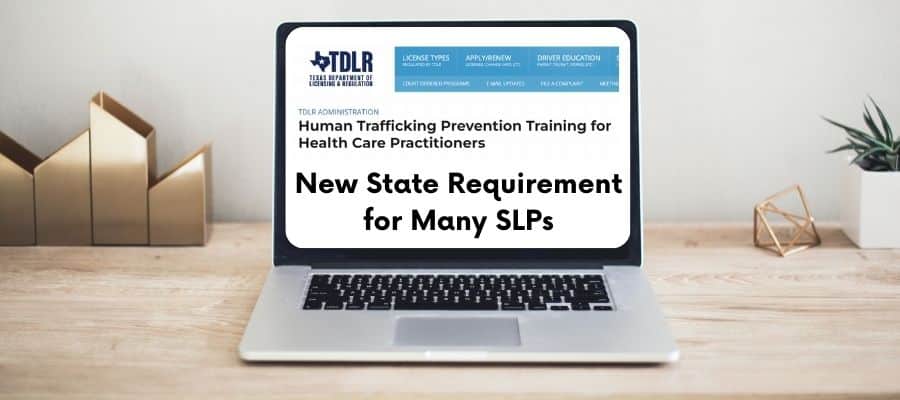If you are like us, you may have gone to renew your state license recently and found that your state is now requiring continuing education on human trafficking for speech language pathologists. This has been in place for states like Texas since 2020 and more states are either considering the requirement or are already putting it in place.

This is an extremely tough and sensitive topic and we have heard from many of you asking about the new requirement and also where to find relevant courses. So, we wanted to do two things here: talk about the new regulations as well as our experience taking courses, and highlight which courses to take.
1) Why is human trafficking an important topic for speech pathologists to know about?
We will talk about our experience taking the courses and three key take-aways in terms of how the topic relates to speech language pathology. It was a transition from “I can see why this is something health care professionals need to know about” to “I can’t believe what I am learning. This is definitely something SLPs need to know about.”
2) Which human trafficking courses can speech language pathologists take?
We provide a list of available courses on human trafficking for SLPs. When we began looking for courses, many of them were jumbled together with courses for dentists, nurses, radiologists… and it wasn’t clear which ones met our requirements. So we reached out to our sister CE companies and verified which courses SLPs could take and which link to go to. It was clear that they put a lot of professional effort into covering a delicate topic.

Lessons Learned from Human Trafficking Course for Speech Language Pathology
There are three take-aways that will forever inform our practice and motivated us to use this platform to share the good work consolidated in the courses below.
1. Health care workers and educators are often the first point of contact for people trying to escape.
Part of the reason that this topic has not been brought to light is because the victims themselves are hidden away and not allowed to interact with anyone else. The person who abducted them does all the talking, takes care of anything outside of the house, and is with them constantly if they do venture into public. The few circumstances where the assailant and victim are separate often include health appointments or schooling. Schooling is hard to avoid legally because a child not going to school could attract more attention.
That puts speech language pathologists squarely in the arenas where help is first offered or sought because they provide rare opportunities for the victim to be alone. These trainings give us the knowledge of signs of trafficking and how to intervene.
2. Human trafficking is not human smuggling.
Working in a border state I feel we are pretty knowledgeable about immigration. We work with families on a daily basis that have come from different countries in a variety of ways. We have families where members of the family have been deported or where siblings are divided by the border and are awaiting proceedings. We also regularly hear about border-crossing attempts by smugglers bringing immigrants into the country. However, clear distinctions were made between trafficking and smuggling.
Human trafficking involves exploiting men, women, or children for the purposes of forced labor or commercial sexual exploitation. Human smuggling involves the provision of a service—typically, transportation or fraudulent documents—to an individual who voluntarily seeks to gain illegal entry into a foreign country.
The Cornerstone Report
It was eye-opening to learn this distinction because trafficking can occur with citizens, in our cities, without movement between locations, let alone across borders. Human trafficking does not need to involve foreign individuals and, in fact, happens as often to U.S. citizens. Human traffickers are just as likely to know the victim such as family members and neighbors as they are to be strangers. A human trafficking victim doesn’t need to travel. Many abuses begin and remain in the home.
3. Human trafficking is not a far away or uncommon issue.
To learn about human trafficking is one thing. But to see recent news stories from nearby cities really makes it hit home. In the course that I watched they were discussing prevalence and the many forms that human trafficking takes. Rather than talk obliquely, they shared news stories of convictions from around the state. These are neighborhoods I had just driven through to go to museums on spring break. These are cities we visited when taking our daughter to look at colleges.
Courses on Human Trafficking for Speech Language Pathologists
We researched available courses that could be taken by SLPs. A lot of difficult interviews, research, and facts were gathered by a lot of carrying professionals to present this topic in a professional way. Here are agencies that responded and how to find their courses.
Price
A quick note on the cost of the SLP human trafficking courses. We didn’t list prices below because those always change. Regardless, many of the courses are free. The paid courses range from $9-$25 and some of them donate your money to the cause they are presenting on. So all-in-all the price is not a significant determination.
| Course | Hours | Link | Description |
|---|---|---|---|
| Texas Human Trafficking Resource Center HEART Training | 1.5 hours | Texas Health and Human Services Commission | The HEART training teaches healthcare practitioners how to identify and respond appropriately to potential human trafficking victims in health care settings using victim-centered approach practices and trauma-informed care principles. |
| Human Trafficking Prevention for Healthcare Personnel | 1.5 Hours | Advanced Health Education Center | The Human Trafficking Prevention for Healthcare Personnel course is taught by Damon Jackson, who has over 20 years of experience in classroom and hands-on instruction, over 15 years of experience in law enforcement, and has been a long-time faculty member at Advanced Health Education Center. Everyone who has attended a course presented by Damon knows about the passion and enthusiasm he brings to his courses, and we are confident he has created a comprehensive course that will be both informative and captivating for all healthcare professionals. |
| An Introduction to Human Trafficking for Texas Healthcare Providers | 1.5 hours | Allied Health Education | The focus of this course is to specify warning signs, risk factors and indicators associated to human trafficking. We will discuss some recent statistics related to the prevalence of Human Trafficking and its widespread impact on the United States. It will include an interview with Sophia Strother, human trafficking survivor and overcomer as well as community advocate and speaker. |
| Red Flags of Human Trafficking | 2 hours | 3rd Millennium Classrooms | Red Flags is a 2-hour, trauma-informed online course designed to equip healthcare providers with the awareness to recognize signs of human trafficking and respond appropriately. |
| Texas Required Human Trafficking Training | 2 hours | AchieveCE Education Services | Learn about human trafficking, its types, warning signs, and reporting mechanisms in this CE designed for Texas health care professionals. |
More Resources on Human Trafficking
Each of the Human Trafficking for Speech Language Pathologist courses has tons of resources, contact numbers, and ways to help the organization. Nationally, there is also a huge effort to bring this topic into the light and provide resources for professionals and community members that come into contact with someone who may be trafficked.
PDF “Stop Human Trafficking” poster – multi-language version
PDF: Human Trafficking Red Flags
National Human Trafficking Hotline
Blue Campaign: U.S. Department of Homeland Security
Delicate topic, we know. We would love to hear any questions or comments that you have about the requirements and definitely let us know if you found a course that was helpful that we did not list above.

